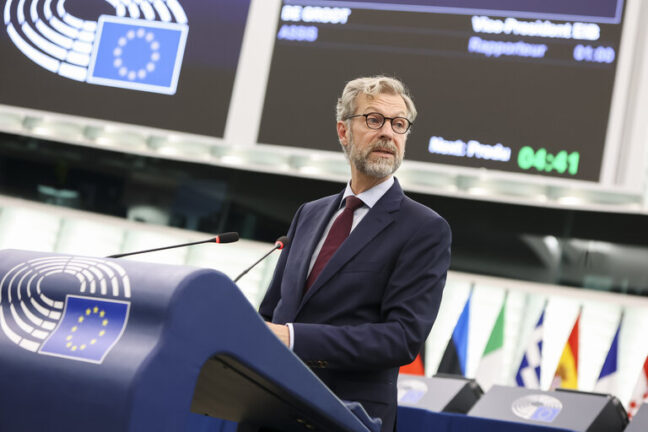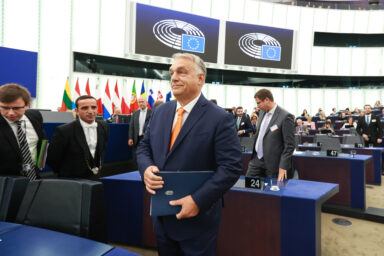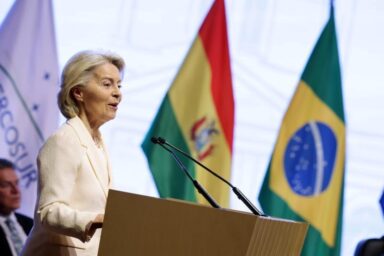Once known primarily as the EU’s “climate bank,” the European Investment Bank (EIB) is now being asked to do much more. Amid growing geopolitical tension, a push for competitiveness, and the urgent need for strategic autonomy, MEPs increasingly look to the EIB to plug Europe’s widening investment gap and finance critical infrastructure.
This week, the European Parliament debated a report on the EIB’s financial activities in 2024, drafted by the Economic and Monetary Affairs Committee (ECON). Broadly, MEPs welcomed the bank’s realignment with the European Commission’s shifting priorities, particularly its expanded focus on defence and competitiveness.
Rapporteur Francisco Assis (S&D/PT) noted that the debate around the EIB reflects the broader political shift in the EU itself. Those who support a stronger, more strategically autonomous Europe saw the bank’s evolving role as a logical and welcome step.
Still, many underlined that the EIB cannot shoulder Europe’s investment needs alone. The debate heard reiterated calls to complete the capital markets union and banking union, with Commissioner Maria Luís Albuquerque (Financial Services and the Savings and Investments Union) stressing that the EIB’s contribution in this regard is “more important than ever.”
You might be interested
A new defence role
EIB Vice-President Robert de Groot addressed Parliament to outline the bank’s new direction. Since June 2024, the bank has focused its resources on eight strategic priorities, with defence seeing the most dramatic shift. The EIB is now allowed to finance military-related projects. Previously, the Bank only had a mandate to fund dual-use (civilian and military) project.
Commissioner Albuquerque as well as several MEPs welcomed this new direction. Kinga Kollár (EPP, HUN) further stressed the need for defence as a deterrent and called to distribute investments more equitably across regions. “Our economic dependency is a threat,” she said, suggesting that the EIB should operate more like private markets while supporting lagging areas.
Yet for some, this didn’t go far enough. MEP Anouk van Brug (Renew/NL) urged the bank to also break its “taboo” on financing weapons and ammunition to fully strengthen the EU’s security capacity. “It’s time to invest in our defence with confidence,” she argued. Vice-President De Groot, however, pushed back: “We are an investment bank, not a credit institution.”
Energy, tech, and housing
Energy security remains a top EIB priority. The bank is currently co-financing 40 per cent of ongoing projects aimed at reinforcing Europe’s energy networks, such as a €1.6bn underwater electricity cable between France and Spain.
The bank also expects to have mobilised €250bn by 2027 in clean tech investment. “We must be bigger, faster, and simpler,” said Mr De Groot, referencing the urgent need to streamline procedures for SMEs. He noted that in the current situation, Europe lacks scale-up financing to turn ideas into global champions. The EIB, as “Europe’s largest venture capitalist”, can play a crucial role in this, by helping startups receive the necessary means without having to look for finance outside of Europe.
Green transition and competitiveness can go hand in hand. – MEP Ľudovít Ódor
Affordable and sustainable housing has emerged as another key investment area. The bank aims to support the construction and renovation of 1.5 million homes by 2030, focusing on student accommodation and housing for public sector workers. Over €4bn is earmarked for innovation and renovation efforts, with MEPs welcoming the bank’s increased involvement in the rental market.
Governance and oversight
As the EIB’s role expands, calls for stronger democratic accountability have grown louder. Rapporteur Assis emphasized the need for a formal interinstitutional agreement between the Parliament and the EIB. De Groot defended the bank’s governance, pointing to “multi-layered accountability,” independent audits, and robust oversight mechanisms.
Some, however, view the EIB’s expanding role as an unwelcome politicisation of the bank’s mandate. Enikő Győri (PfE/HU) criticized what she sees as ideological overreach. “Brussels is pursuing an economic policy based on ideology,” she said, citing high energy prices due to climate change plans and productivity considerable lower than the US. She urged the bank not to “yield to pressure from the left” on issues such as human rights conditionality and codes of conduct.
The MEPs’ views on the bank’s role varied sharply. Giovanni Crosetto (ECR/ITA) similarly pushed back against the EIB’s continued emphasis on green transition, arguing that the bank should serve all EU priorities, not just those set by “socialists and Greens.” In contrast, Ľudovít Ódor (Renew/SVK) argued for a more integrated approach: “Green transition and competitiveness can go hand in hand,” he said.
Brussels is pursuing an economic policy based on ideology. MEP Enikő Győri
According to Marc Botenga (The Left/BEL), the EIB is “turning wine into acid” by aligning itself with the Commission’s shifting priorities. He urged the bank to uphold its role as the “greatest multilateral financial institution” by focusing on core priorities such as infrastructure, hospitals, and schools , rather than, in his words, following the Commission’s lead and becoming a mere financier of war.
Looking ahead
The Commission welcomed the EIB’s newly approved €100bn financial ceiling for 2025 and the upcoming omnibus regulation under InvestEU, which it said will “make the lives of beneficiaries easier” and help mobilize up to €75bn in public and private funds “at no cost to the European taxpayer.”
Looking forward to the next Multiannual Financial Framework, the Commission stressed the need for efficiency and predictability to ensure investor confidence and increase the EIB’s impact.











